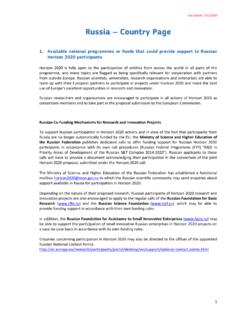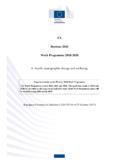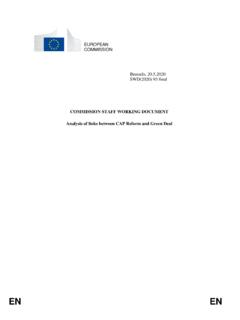Transcription of COMMUNICATION FROM THE COMMISSION TO THE …
1 EN EN european COMMISSION Brussels, COM(2020) 66 final COMMUNICATION FROM THE COMMISSION TO THE european PARLIAMENT, THE COUNCIL, THE european ECONOMIC AND SOCIAL COMMITTEE AND THE COMMITTEE OF THE REGIONS A european strategy for data 1 A european strategy for data 1. Introduction Over the last few years, digital technologies have transformed the economy and society, affecting all sectors of activity and the daily lives of all Europeans. Data is at the centre of this transformation and more is to come. Data-driven innovation will bring enormous benefits for citizens, for example through improved personalised medicine, new mobility and through its contribution to the european green deal .
2 In a society where individuals will generate ever-increasing amounts of data, the way in which the data are collected and used must place the interests of the individual first, in accordance with european values, fundamental rights and rules. Citizens will trust and embrace data-driven innovations only if they are confident that any personal data sharing in the EU will be subject to full compliance with the EU s strict data protection rules. At the same time, the increasing volume of non-personal industrial data and public data in Europe, combined with technological change in how the data is stored and processed, will constitute a potential source of growth and innovation that should be tapped.
3 Citizens should be empowered to make better decisions based on insights gleaned from non-personal data. And that data should be available to all whether public or private, big or small, start-up or giant. This will help society to get the most out of innovation and competition and ensure that everyone benefits from a digital dividend. This digital Europe should reflect the best of Europe - open, fair, diverse, democratic, and confident. The EU can become a leading role model for a society empowered by data to make better decisions in business and the public sector.
4 To fulfil this ambition, the EU can build on a strong legal framework in terms of data protection, fundamental rights, safety and cyber-security and its internal market with competitive companies of all sizes and varied industrial base. If the EU is to acquire a leading role in the data economy, it has to act now and tackle, in a concerted manner, issues ranging from connectivity to processing and storage of data, computing power and cybersecurity. Moreover, it will have to improve its governance structures for handling data and to increase its pools of quality data available for use and re-use.
5 Ultimately, Europe aims to capture the benefits of better use of data, including greater productivity and competitive markets, but also improvements in health and well-being, environment, transparent governance and convenient public services. The measures laid out in this paper contribute to a comprehensive approach to the data economy that aim to increase the use of, and demand for, data and data-enabled products and services throughout the Single Market. This COMMUNICATION outlines a strategy for policy measures and investments to enable the data economy for the coming five years.
6 This data strategy is presented at the same time as the COMMISSION s COMMUNICATION on Shaping Europe s digital future and a White Paper on 2 artificial intelligence that indicates how the COMMISSION will support and promote the development and uptake of artificial intelligence across the EU. On the basis of this strategy, the COMMISSION launches a comprehensive consultation on the specific measures that could be taken to keep the EU at the forefront of the data-agile economy, while respecting and promoting the fundamental values that are the foundation of european societies.
7 2. What is at stake? Growing data volumes and technological change The volume of data produced in the world is growing rapidly, from 33 zettabytes in 2018 to an expected 175 zettabytes in 20251. Each new wave of data represents major opportunities for the EU to become a world leader in this area. Furthermore, the way in which data is stored and processed will change dramatically over the coming 5 years. Today 80% of the processing and analysis of data takes place in data centres and centralised computing facilities, and 20% in smart connected objects, such as cars, home appliances or manufacturing robots, and in computing facilities close to the user ( edge computing ).
8 By 2025 these proportions are likely to be inverted2. Aside from the economic and sustainability advantages that this development presents, it opens up additional opportunities for businesses to develop tools for data producers to increase control over their own data. The importance of data for the economy and society Data will reshape the way we produce, consume and live. Benefits will be felt in every single aspect of our lives, ranging from more conscious energy consumption and product, material and food traceability, to healthier lives and better health-care. Personalised medicine will better respond to the patients needs by enabling doctors to take data-enabled decisions.
9 This will make it possible to tailor the right therapeutic strategy to the needs of the right person at the right time, and/or to determine the predisposition to disease and/or to deliver timely and targeted prevention. Data is the lifeblood of economic development: it is the basis for many new products and services, driving productivity and resource efficiency gains across all sectors of the economy, allowing for more personalised products and services and enabling better policy making and upgrading government services.
10 It is an essential resource for start-ups and small and medium-sized enterprises (SMEs) in developing products and services. The availability of data is essential for training artificial intelligence systems, with products and services rapidly 1 IDC, 2018. 2 Gartner, 2017. 3 moving from pattern recognition and insight generation to more sophisticated forecasting techniques and, thus, better decisions. Data will also fuel the wide implementation of transformative practices such as the use of digital twins in manufacturing.










